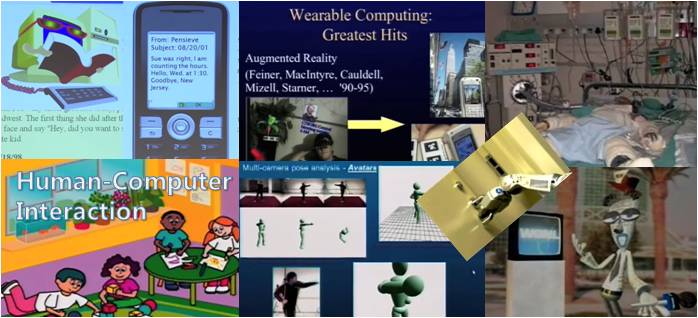CS547: Human-Computer Interaction Seminar
CS547: Human-Computer Interaction Seminar (Stanford Univ.). Human-Computer Interaction Seminar (Seminar on People, Computers, and Design) is a Stanford University course that features weekly speakers on topics related to human-computer interaction design. The seminar is organized by the Stanford HCI Group, which works across disciplines to understand the intersection between humans and computers.
 |
CS547: Human-Computer Interaction Seminar (2013-2014)
Lectures: Magical Thinking: Fear, Wonder & Technology. Big Data as Both a Window and a Mirror. Beyond Flat Displays: Interactivity on Any Surface. Fieldwork: Digital Art as Inquiry in the Open Studio. Building Social (and Discussion) Software for the Anti-Social. Cumulative Innovation & Open Disclosure of Intermediate Results. Managing Personal Information with Private, Accountable Crowdsourcing. Design Thinking Tools for the Individual, Group and Community. ...
CS547: Human-Computer Interaction Seminar (2012-2013)
Lectures: Comfortable, Communal, and Creative Computing. Designing Calming Technology. Balancing Design and Technology to Tackle Global Grand Challenges. Hybrid Assemblages, Environments and Happenings. Crowdsourcing: Achieving Data Quality with Imperfect Humans. CitiSense: Always-on Participatory Sensing for Air Quality. Crowds, Crisis, and Convergence. Interactivity as a Medium. ...
CS547: Human-Computer Interaction Seminar (2011-2012)
Lectures: Natural Interactions & Computing for Global Development. To Friend and to Trust: Eliciting Trustful and Useful Ratings Online. Interaction Design for the Quantified Self. Human-Centered Computing for Creativity and Expression. Designing Engaging Information Technology. Trajectories and the Extended User Experiences. Peer to PCAST: Open Video and Open Government. Enhancing Creativity with Interactive Paper. ...
CS547: Human-Computer Interaction Seminar (2010-2011)
Lectures: Good Boss, Bad Boss. The Psychological Basis for UI Design Rules. Computing and Autism: A Rule for Technology and Technologists. Open Mobile and Social Computing. Story Time for the 21st Century. One Fabrication Lab Per Child: The Ultimate Construction Kit. Interacting With and Through Personal Robots. Data + Art. ...
CS547: Human-Computer Interaction Seminar (2009-2010)
Lectures: Crowdsourcing Work. Backtracking Events as Indicators of Software Usability Problems. Programming by Sketching. Aesthetic Science of Color. Segmenting and Connecting: From Event Perception to Comics. Why is the Google Book Search Settlement So Controversial? Multi-Sensor HCI for Smart Environments. Enabling Practical Ubiquity. ...
CS547: Human-Computer Interaction Seminar (2008-2009)
Lectures: Pario: the Next Step Beyond Audio and Video. Sculpting Behavior: Developing a Language for Hands-on Learning. Tap is the New Click. Social Annotation, Contextual Collaboration, Online Transparency. Enlightened Trial and Error: Gaining Insight Through New Tools. Computer Graphics as a Telecommunication Medium. Not Invented Here: Online Mapping Unraveled. Understanding Fish Reactions to Their Reflection. ...
CS547: Human-Computer Interaction Seminar (2007-2008)
Lectures: Designing Interactions that Combine Pen, Paper, and PC. Accountability of Presence: Location Tracking Beyond Privacy. Augmented Social Cognition. Designing a Health Care Interface. Toward Adaptive Services for Personal Archiving. Data Modeling and Conceptual Sketching in the Design Process. ChucK: A Computer Music Programming Language. Context Aware Computing: Understanding Human Intention. ...
CS547: Human-Computer Interaction Seminar (2006-2007)
Lectures: Finding Balance: Addressing Cognitive Dissonances. Expressive Intelligence: AI, Games and New Media. Sensing Technologies for Future Computing Form Factors. Designing for the Self. From Personal Computers to Personal Information Environments. Windows Vista Dev: Innovation on User Research Methods. Technology for Developing Regions. Koala: End User Programming on the Web. ...
| References |
| CS547: Human-Computer Interaction Seminar Seminars - Stanford HCI Group. Archive. 20 years of speakers. By year. By speaker. Watch all lectures online. Record your attendance. |